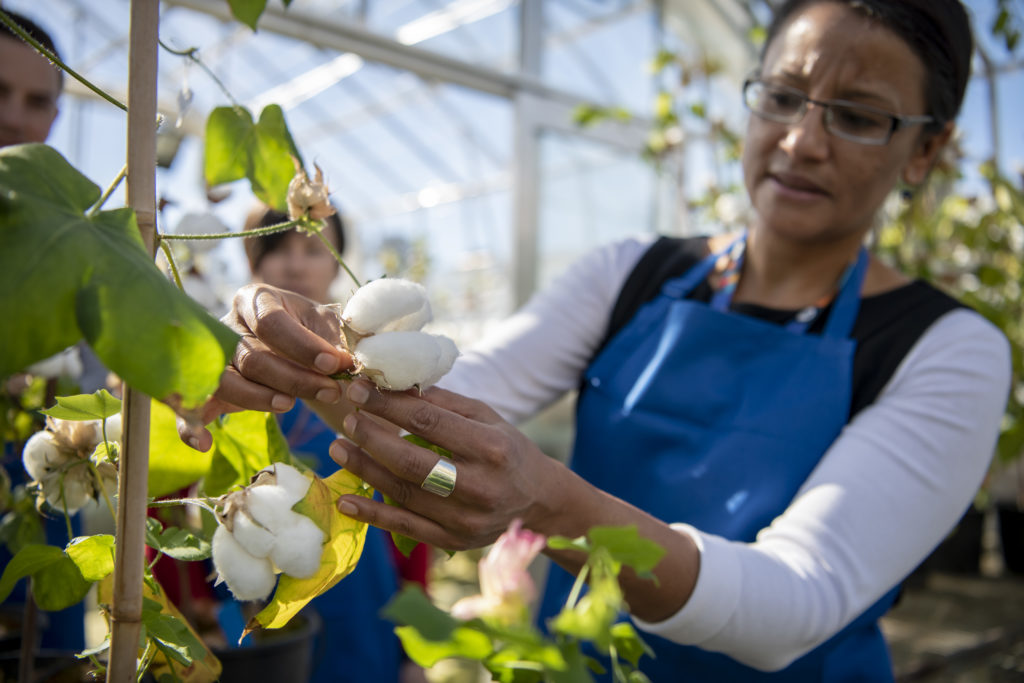
Imagine a shirt with the soft, natural feel of cotton but it doesn’t need to be ironed, or active wear that breathes and is not smelly.
Sure, there are lots of synthetic fibres that can do these things. They may be cheaper to produce and require less maintenance, but there is a major drawback: synthetics are made from petrochemicals and every time you wash them, tiny microfibers of material are pulled free and enter our waterways. These do not breakdown and can build up in the food chain.
When you wash cotton, fibres are also shed but these are biodegradable and will break down rapidly in the environment.
Why can’t we have both?
Our scientists, Dr Madeline Mitchell, Dr Filomena Pettolino and their colleagues are working on a consumer-friendly ‘next generation cotton’ that has benefits normally associated with synthetics like polyester and nylon.
Every cotton fibre is a single cell. Our scientists are working on better understanding what genes and external factors determine the length, strength and fineness of cotton fibres.In their quest to develop cotton fibres that are stretchy, non-creasing or even waterproof, the researchers are growing a wide range of different cotton plants. One of these is nicknamed ‘Shaun the Sheep’ because it has extremely short, dense fibres.
“We’re also identifying molecules that already exist in nature and seeing how we can put these into cotton cell walls to change the way cotton fibres behave,” explains Dr Mitchell.
There are some 100 per cent cotton products currently being sold as not requiring ironing but these tend to have been treated with chemicals to give them their special properties.
The next generation cotton research is part of our Synthetic Biology Future Science Platform, a $13 million investment in science that applies engineering principles to biology. SynBio projects aim to provide societal benefits and opportunities for a wide range of industries.
The research builds on more than 30 years of cotton breeding in partnership with Cotton Seed Distributors. Thanks to these efforts, Australian cotton is now considered among the best in the world and the most water efficient. Current cotton varieties use up to 85 per cent less pesticides and 60 per cent less herbicides than their predecessors.


21st March 2022 at 1:31 pm
Your blog contains very thoughtful content. It is really very helpful. Please keep sharing such post. I hope this kind of cotton canbe use in this Cotton Roving Machine.
12th September 2020 at 9:24 am
Cotton is planted in a glass solar greenhouse, where the temperature, moisture, and sunlight can be adjusted appropriately. Meet the production requirements of cotton.
https://havitsteelstructure.com/metal-building/steel-warehouse-building/
30th June 2020 at 1:06 am
Have the group published a paper on their work yet?
I would love to present it at the journal club in my next lab meeting.
8th July 2020 at 5:57 pm
Hi Katia, thanks for your patience while we reached out to our researchers for a response. While we have not published journal papers specific to this work they recommended these pieces that you may be interested in:
https://publications.csiro.au/publications/#publication/PIcsiro:EP165114
https://publications.csiro.au/publications/#publication/PIcsiro:EP176417
https://publications.csiro.au/publications/#publication/PIcsiro:EP134055
https://publications.csiro.au/publications/#publication/PIcsiro:EP14540
Thanks,
Georgia
Team CSIRO